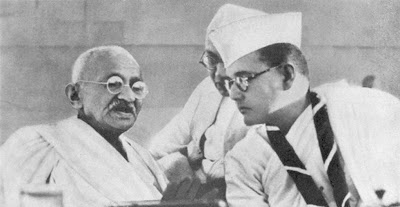A decade and a half of intermittent indiscipline in food routine has led me to gastric ulcer.
I know I'll fight out of it and the weakness it causes. However, such dizziness of mind put me face to face with an important question.
Last few days I was in the world of DA Vinci Code, Meluha and Panchavati, ancient Egypt and medieval Nalanda, Istvan Szabo's works on the modern holocaust and Exodus. And finally Spielberg.
That struck me face to face with the question - which films I must make now? Whose story can I tell most faithfully, and interestingly?
Photo Source: Wikipedia
Framegrab from Chhinnamul (1950)
Of course mine. And what is my story? The most haunting two are the Exodus of my people, after the partition; and the Naxalites. So few films have been made on the former, and so few logical treatments of the latter. But why?
I grew up hearing stories from my mom. Things were different there, on the east side, which is now Bangladesh. The most fertile land in the world - the Branga in Amish' Shiva Trilogy.
We always had a problematic relationship with the pure Calcuttan's, people from this side of the partition.
Even to date I have a problem in mixing with them - they are neither another culture altogether nor my own.
Their language and body language are ours, finally. But, they are different in social mores, cuisines, purpose of life and cleanliness.
Lots of us lost much and many while crossing the border. Many were deceived after reaching Calcutta.
A lot were deported to Andaman and Dandakaranya. Interestingly Amish' books connect Bongs to Dandakaranya, 3000 years back!
Bengal Congress always had an independent stance from the Indian National Congress. Right from the time of S N Banerjee.
The difference became an eye sore at the time of Bipin Chandra Pal.
Subhas Bose took that difference to the greatest height and finally walked out of Congress, with a distanced respect for Gandhi, but with a disagreement on the latter's politics.
Photo Source: Wikipedia http://en.wikipedia.org/wiki/Subhas_Chandra_Bose#mediaviewer/File:Bose_Gandhi_1938.jpg
Who could forget the war between Harshavardhana and Shashanka, the last Gupta King?
And Bengal suffered the worst in the partition.
Many films have been made on the Punjab partition. But why only one (or two?) on the Bengal side of that?
Bengalis here supported that '52 language revolutionaries, and the '71 liberation war.
The same Bengal that was suffering from the last State vs Naxalite fights.
And Naxalbari, the village, is in Bengal!
I have a personal, family connection to all these. My parents were refugees, both of them.
They remember those days, the fiery nights of '46, to those one in post-Independence East Pakistan.
My own cousin was one of the top leaders of the '67 Naxalites. My family voted communists to power.
They sheltered the '70s Naxalites.
My dad used to teach in Bengal Engineering College, another den for the red berets of Bengal.
Photo Source: Wikimedia
I have grown up seeing how my family slowly became anti-CPI(M) through the latter's reign in the '80s and '90s. How they started supporting Trinamul Congress, and a whimsical frenzied leader called Mamata.
And I find the essence of the Bengali liberation war, the eternal Bengali psyche, in the same whimsical, frenzied leader called Mamata. She is one of my own.
My personal connections with Liberation, my party membership, troubled my parents.
But, they were supportive. I was never deep into field politics.
I was an interested dilettante at best.
I wanted some hands on practice for the theories I was reading. I was never a professional in politics.
Yet, the positive role of my parents in support of my politics, which was against theirs, always surprised me.
The refugees always had a communist past, probably, even when they denied it most vehemently.
I shall make films. I don't know about rich people's ambitions, or the international missile treaty as the first hand source.
But, I know the story of my family, my relation to the modern Bengal - both sides of the partition, how I can never see the two sides as separate.
I know my connection to Bangladesh, the roots of my deep hatred for any religion, my concern for the original Buddhism, my love for strikes and confrontation.
I detested a comically made Bose: the Forgotten Hero.
I still wonder in silence what forced Shyam Benegal to make such a pathetic film!
I don't know about others' stories. But, I know my roots. I have grown up with them.
Filmmaking is like writing a book, like leaving a treasure-trove for the next generations. Opening the trove would give them a glimpse of how things were like.
A ploy to fight the collective amnesia.
Not easy. But, not impossible either.




